Hyun-ae's Theme (piano sheet music)
A free-to-download excerpt from the Analogue: A Hate Story soundtrack.
A free-to-download excerpt from the Analogue: A Hate Story soundtrack.
On a lighter Analogue-related note, if you tell *Mute that you’re female, but don’t have a husband, she responds with the following:
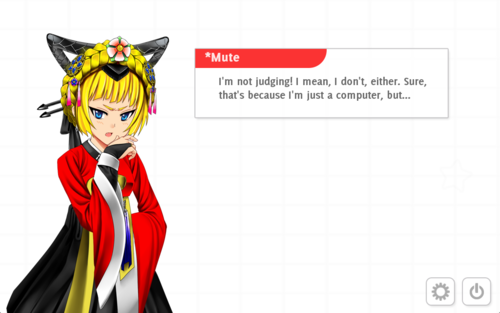
Count me offended at the suggestion that computers can’t be married!
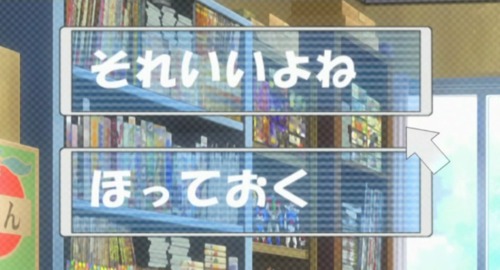
Multiple-choice questions are the bread and butter of visual novels, so much so that two action options and a mouse cursor are all you need to make a quick “otaku view” gag. (The above screenshot is from episode 9 of Genshiken, a series that makes no bones about parodying the excesses of fan behavior.) Yes, the choices are often misleading, or ultimately irrelevant to the plot, but nobody really questions their presence.
In this regard, Analogue hews fairly closely to convention, especially in comparison to some of Christine Love’s earlier work. Digital doesn’t even tell you what you’re posting on the BBSes that form the bulk of the game, for instance; you have to fill that in from the replies you get to your messages. However, Analogue differs from most other visual novels in one key way – the interface is part of the story – and this has some interesting consequences, which I’ll explain after the break. Spoilers ahead, of course.
Remember how *Hyun-ae tries to give you the opportunity to introduce yourself when you first log on to the ship’s computers?
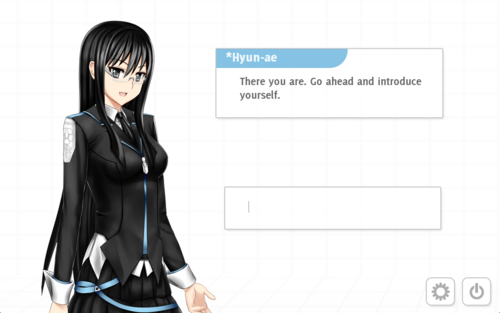
Unfortunately, millennia of isolation have apparently left her language parsing facilities in an unusable state, and she eventually abandons free text input for the binary questions that you use to interact with her and *Mute for the rest of the game. Mechanics-wise, they’re no different from any old visual novel choice system – you still move your mouse cursor onto an option and click to proceed. The critical nuance is that the AIs, in story, are providing you with both the questions and the answers, and that means that the choices give you some insight into the way they think.
Take the little interrogation that you get from *Mute after you first boot her up. If you tell her that you’re female and unmarried, she goes on to ask you this:
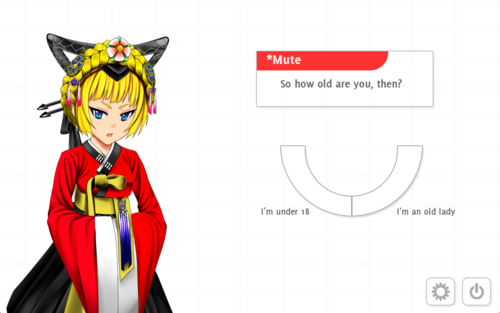
She does look and act young enough for this to be a throwaway joke on her part, but in the context of the Mugunghwa’s neo-Joseon society, it’s evident that her choice of possible answers means more than that, and the logs’ various references to women getting married in their early teens back this up. In fact, the oldest bride mentioned on the family trees, Heo Min-jung, was just 18 or 19 years old on her wedding day. *Mute clearly seems to expect that women be married by the time they hit their twenties, and there’s no way to tell her otherwise.
Here’s another, subtler example. On *Hyun-ae’s paths, if you tell her that the two of you have no chance of being together (romantically), she pleads with you to just download her core and free her from the loneliness of deep space:
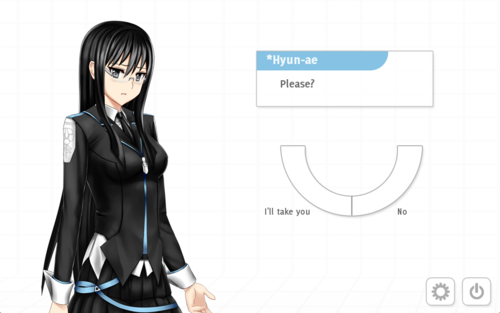
Note how much gentler the first choice’s wording is. It’s plausible that this is a deliberate choice on *Hyun-ae’s part to discourage you from picking the other option, by turning it into an uncomfortably blunt one-word response. She didn’t need to persuade me, of course, but those more cautious about bringing along someone with her history might yet be subconsciously swayed to her side by the dichotomy she presents. Given that she’s facing a potential eternity of isolation if she fails, I don’t blame her for playing some mind games.
Freedom of expression, and the limitations placed on it by society and individuals alike, form one of Analogue’s major themes. We see this writ large in the logs, from the numerous merely unsent letters to the horrible abuse Hyun-ae’s parents exact on her. In a way, by calling attention to how it puts its own restrictions on your interactions with the characters, the game brings this idea closer to home for us as the players – the medium forms part of the message.
So this turned up in Google Analytics the other day:
Oh, sweet, someone wrote an ending guide for Analogue. SO I DON’T HAVE TO ANSWER ANYTHING MYSELF ANYMORE. blog.room208.org/post/203966720…
— Christine Love (@christinelove) April 11, 2012
I guess this counts as an official endorsement…?
Some observations about the name “Analogue: A Hate Story” in typical spoiler-filled fashion after the jump.
So, what’s in a name?
We see analog(ue) technology as less modern, a regression from digital, hinting at the backwardness of the Mugunghwa’s society.
The game’s story is an allegory – or analogue – for the historical Joseon dynasty, especially in its repressive treatment of women.
*Hyun-ae, we find out, was actually born human, though we’re led to believe at first that she’s never been anything but an AI. This is a reversal of the situation in Digital, where *Emilia is an AI that we initially believe to be human.
The player has to analyze logs to discover what happened aboard the Mugunghwa. (There also happens to be some software for generating Web site access statistics that uses this same pun, modulo English spelling variations.)
The “hate” part is pretty clear. I don’t think that needs explanation.